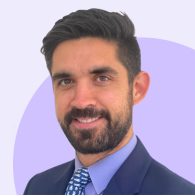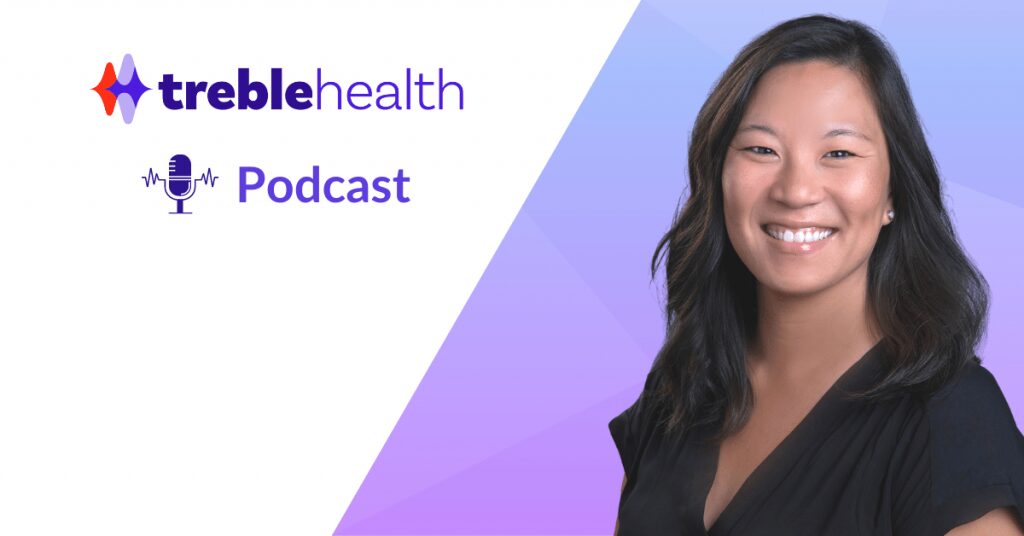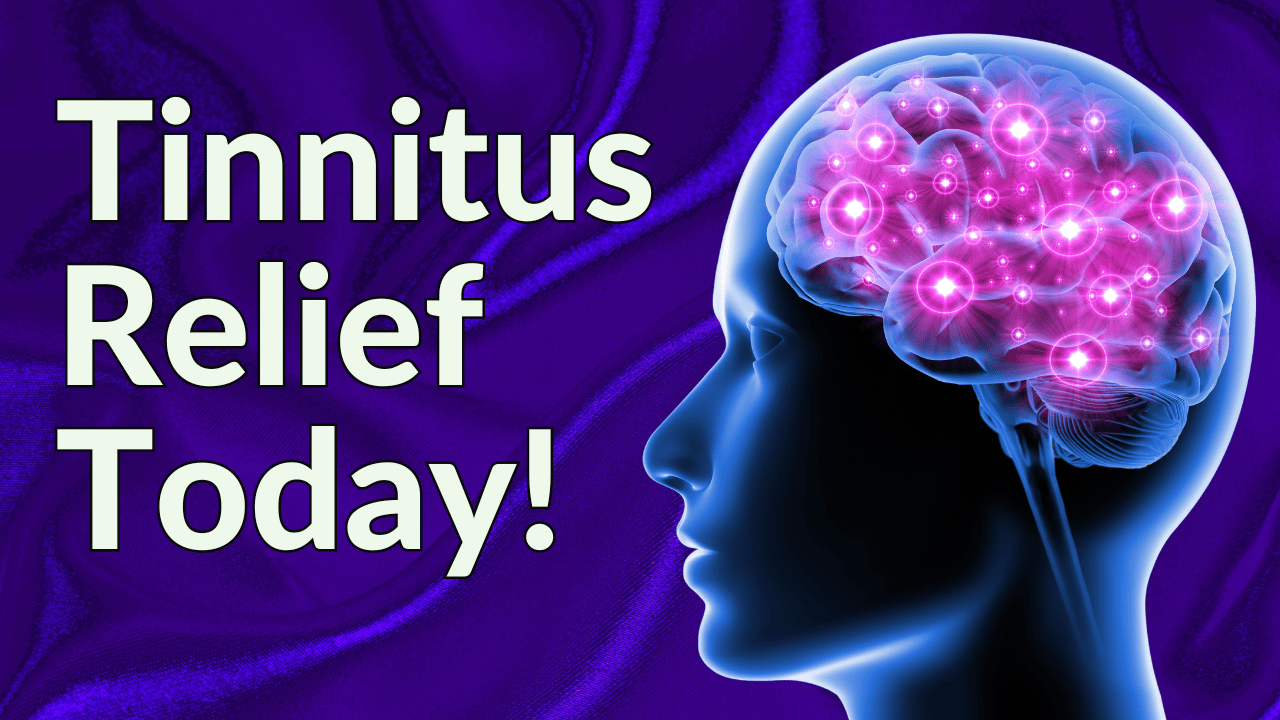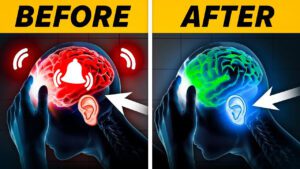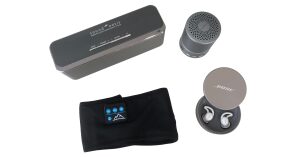Ben Thompson, AuD.
Hello to the Treble Health community. My name is Dr. Ben Thompson. I am here with Dr. Tracy Peck Holcomb, who is the newest audiologist at Treble Health. Dr. Tracy joins us with extensive experience, and in today’s podcast, we are going to talk for a long time about the most important things, including why tinnitus success stories are so important, different causes of tinnitus and how that affects treatments, Dr. Tracy’s experience in San Francisco at a major clinic working with tinnitus patients, and what we’re seeing at the time making this video in 2022, with what our patients need to get better. Dr. Tracy Peck Holcomb is an audiologist who’s been providing compassionate tinnitus care for over 15 years. Her clinical specialty is in the area of tinnitus and hyperacusis management. She has served on several advisory boards for both clinical and academic audiology and has given numerous presentations and lectures on hearing and tinnitus throughout the state of California. Dr. Peck Holcomb received her doctor of audiology degree in New York at Buffalo and she is a fellow member of the American Tinnitus Association, as well as a past president and board member of the California Academy of Audiology. Dr. Tracy, welcome and thank you for being here.
Tracy Peck Holcomb, AuD.
Thanks so much for having me. It’s a pleasure to be here.
Ben Thompson, AuD.
Yeah. We want to know about your experience with tinnitus and hyperacusis, what you’ve seen over the years. Please tell us a bit about how this whole journey started becoming an audiologist, and learning about tinnitus and choosing to specialize in this field.
Tracy Peck Holcomb, AuD.
Absolutely. So I actually started in undergrad. I happened to just see in the course catalog a course on speech and hearing sciences, and it looked interesting and signed up, and pretty quickly realized that I really liked the audiology track. I liked the neuroscience of it, I liked the counseling part of it. So my undergraduate degree from the University of Buffalo is in communicative disorders and sciences, and then it just happened to be, I mean, UB has a pretty big tinnitus researchers in the field. So I kind of just serendipitously was exposed to tinnitus, There was a tinnitus support group, a lot of information and exposure to that, which I think, you know, there’s not, at least at that time, there wasn’t a lot of that at different AUD programs.
"Treble Health helped me reduce my tinnitus by about 80%, and now I can live my life again!"


"Treble Health helped me reduce my tinnitus by about 80%, and now I can live my life again!"
– Steve D.
Book a free consultation to learn which Treble Health solution is right for you. Join Steve and thousands more who have found lasting tinnitus relief.
So I think that piece of it, and then just also kind of having a strong interest in psychology and counseling, it was sort of the perfect blend of, you know, my interests. And so from there, I came out to San Francisco where I did my fellowship year to get my doctorate at the Hearing and Speech Center. And again, just really luckily ended up working under Dr. Malvina Levy, who is well known in the Bay Area for her work in tinnitus. And so I happened to just be lucky in getting, you know, mentored by her, having the opportunity to co-facilitate with her, the monthly support group that’s still going on at the center, and just kind of, it was the perfect fit for me of my clinical interests and just, it’s just been a really, you know, great sort of career path for me to be able to help patients who, you know, have been around and around searching for help, searching for providers, searching for answers and to be able to provide that for people is just really, really gratifying.
Ben Thompson, AuD.
Absolutely, and we’re happy you’ve chosen this specialty. If you can think back, what were those first few moments when you saw that someone with bad, loud, bothersome tinnitus could get better? Where did you first see that in San Francisco, and how did that affect your future? You know, I remember personally, moments like that, gave me the confidence to counsel patients and explain, “Hey, we can get better here, “that most people can get better.” Do you recall similar experiences when you first started working with tinnitus patients in San Francisco?
Tracy Peck Holcomb, AuD.
Yeah, I mean, I think, you know, it’s hard when you’re a new provider, especially with a clinic population that, you know, has been struggling a lot and having a really hard time, it can be pretty intimidating. I think my mentor sort of just threw me into it, which was probably the best thing to do. And, you know, I could see, I mean, people were coming in just completely distraught, and sort of have tried, you know, tried everything, seen, like I said, seen multiple providers, feeling pretty hopeless. And even just having one appointment, one session, and sort of taking the time to validate what they’re going through, it’s a real thing to take a moment to say, like, I hear you. And yes, like there are some things, there are lots of things actually that we can, you know, work on together to get better. And even just that, I think like a lot of times, even now I hear at the end of initial sessions with patients, they’ll say, “You know, I’m leaving today with a feeling of hope. “I’m leaving today with a sense of like, “I have some power over this, “like I have things that I can do.” And that’s just, it’s huge. It’s a huge part of the beginning of that journey to getting better with your tinnitus.
Ben Thompson, AuD.
Yeah. Tell us about your approach to comprehensive tinnitus care, comprehensive tinnitus management, if someone consults you via telehealth now, or when you previously worked at a clinic in person, what is your path, what is your protocol so to speak of how you assess what is really going on and what we can do about it to help?
Tracy Peck Holcomb, AuD.
So I think my general approach is I really like to get like an extensive case history. I like to really hear what, you know, patients are, have been through, you know, how they think their tinnitus started, how it’s impacting their day to day, their sleep, their stress levels, their family interactions, like all the things that I think can make it really challenging at first to feel like you can manage around it, right? So getting a really extensive case history is really important to me. Establishing that rapport with patients and that level of trust, ’cause I think there’s an inherent, for a lot of patients, there’s this level of like, well, you know, what are you going to be able to do for me? You know, I’ve tried everything. So I think that’s really important to establish, and I think just like, again, validating, you know, this is a real thing, but it’s also something that can get better, and you know, we’re going to work together to customize a plan for you. And I think the other big piece is, that piece of it, that customization. So there are lots and lots of things you can do to help with tinnitus. I think what works for one person might not work for another. So it’s a matter of kind of, you know, fine tuning and finding what combination of different strategies, whether it be sound therapy, whether it be cognitive behavioral techniques, whether it be, you know, mindfulness and meditation, or a combination of all of those things. I think it’s figuring out what’s going to work best for that patient, meeting them where they’re at, and then guiding them through that journey to getting better.
Ben Thompson, AuD.
How long do you typically work with tinnitus patients, for example, weeks, months, over a year, what’s the different timeline that you’ve found after your, you know, over 10 years of specializing in tinnitus? What are the typical time ranges that patients need to get better, to improve to a manageable level where they might be able to manage this on their own and not need the support or the technology?
Tracy Peck Holcomb, AuD.
It varies. I mean, it definitely varies. It depends on where people are at in that journey when they find me, or when, you know, I meet with them. But I think if it’s somebody who’s coming in who, you know, tinnitus is relatively new to them, the onset is relatively new, that within, you know, within the first couple of months or so, you can start to implement some things that help to give them some relief, which as you know, too, you know, from working with patients for several years now, that initially getting that kind of sense of relief, sense of, some sense of control, a little bit of, you know, empowerment goes a long way. But yeah, I mean, I think on average, you know, within three months, if people are kind of doing the things that we know can help, there’s a significant shift. I have had patients, you know, where it takes longer, six months, nine months, but by, you know, by, I’d say on average around six months or so, like most people are doing much better, feel much better. The tinnitus is not controlling them. You know, they’ve regained some of their life back, you know? And so it’s self-fulfilling once you start to feel a little bit better, and the noise or the sound isn’t as bothersome as it was in the very beginning, that fight or flight response has sort of settled down, it progresses pretty quickly to feeling better and having a handle on it.
Ben Thompson, AuD.
Yeah.
Ben Thompson, AuD.
I want to share a story that two and a half years ago, I reached out to you to ask if I could come join your tinnitus support group in San Francisco.
Tracy Peck Holcomb, AuD.
Yeah.
Ben Thompson, AuD.
And at the time I told myself that I want to specialize more and more in tinnitus. I want to learn more about the community. I was seeing patients, yes, but I wanted to create something which ended up becoming a YouTube channel. And I remember being around that table, there was about eight of us. It was one of the first times that I had been so close to a group of individuals in a support group setting. And at first I want to say thank you for letting me sit in on that session, and also gain some insights from your experience leading groups, seeing people go through these cycles of tinnitus, come to the group distraught, get help one on one, be a part of the group and then graduate, right? Leave, move on as most do. What insights do you have from your years of leading the tinnitus support group in San Francisco?
Tracy Peck Holcomb, AuD.
I mean, the beautiful thing about that group is that every, you know, it’s once a month, and you never know. You never know who’s going to show up. You never know that the sort of like combination of people who are going to join. And I think that that’s incredible, because sometimes you have people who are all very newly dealing and trying to cope with their tinnitus. And then you have sometimes people that are sort of in that boat. And then you have people who have, you know, had it for many years, but are doing pretty well, and just kind of want to check in and get that sort of moral support, that sense of peer support and group support, which I think is just so important. And you just, you see this, you know, I try in the group, I try not to, you know, I can talk a lot, but I try to sit back in those groups, and just let the kind of peer to peer mentorship, the peer to peer support come through. And people have just wonderful tips and wonderful ways that have worked for them that they’re so happy to share with people who are kind of newly in and coping, and trying to deal with their tinnitus. And it’s just, it’s so impactful for me facilitating that group to hear from everybody, and I learned just as much during those groups as the people who attend the group. So it’s just such a really cool format for people to share their stories, and to feel like, you know, they’re not alone. And again, there’s a lot you can do, you know? So I think it supports, literally supports kind of the work that you’re doing individually, you know, that people have done on their own. So it’s fantastic. The group piece is pretty phenomenal. Yeah.
Ben Thompson, AuD.
And we plan to continue our own Treble Health monthly group Zoom that’s for any active member in one of our programs. And you also plan to continue to lead the San Francisco group as well, correct?
Tracy Peck Holcomb, AuD.
Correct, yeah. And I just, I also wanted to mention just, you know, during COVID, we shifted to doing the group virtually as a lot of people shifted to doing things virtually. And it just, it’s one of the things that actually drew me to Treble is because just that format, you know, we used to have maybe eight to 10 people, you’re driving into San Francisco, you’re trying to find parking, it’s, you know, not at opportune time. So the virtual format, the virtual platform opened it up significantly. We had people joining from all over the country. So it just was like, wow, like we can really have such a bigger reach in this kind of setting. So that was one of the things actually that had me interested in Treble, so. Yeah.
Ben Thompson, AuD.
In your opinion, what are the benefits now that you’ve been doing telehealth for about two years, right, since COVID started at the time of recording this video. And for us at least, telehealth is something that started with COVID, but will persist and continue on long past it. In your opinion, for giving the best possible care to someone with tinnitus to get the best possible outcomes, that’s what we’re here for. Everything we’re doing as a company is certainly, you know, geared towards that, that’s our goal. In your opinion, what are the pros and cons of telehealth for the tinnitus patient, right? Are there any in person tests that are mandatory, necessary, that someone with tinnitus should definitely get? And then what might be the advantages or the benefits of the virtual or the Zoom format in telehealth for someone with tinnitus?
Tracy Peck Holcomb, AuD.
Yeah, I mean, you definitely want to have, you know, you want to have individuals who have had kind of a thorough diagnostic evaluation, you know, you want to make sure to rule out anything that would warrant kind of–
Ben Thompson, AuD.
Hearing test, right?
Tracy Peck Holcomb, AuD.
Yeah, having a hearing test, you know, making sure that, you know, middle ear function is okay, that there’s not sort of a mechanical issue, you know, wax is blocking the ear, eardrum, things like that. I mean, you want to have that standard, you know, evaluation completed and kind of check that off the list. But as far as like having to do tinnitus, working with tinnitus patients in person versus telehealth, you know, just in the short time that I’ve been seeing patients with Treble, it’s, you really, it’s the same. I mean, you’re still establishing that connection, you’re still able, which I think is the most important part to begin with. You’re still able to, you know, I might be a little bit slow with sharing my screen and doing all the things right now, but you can share all the same information, the same resources, and if anything, you can do it in a much more streamlined, efficient way. And like I said, reach so many other people. I have had patients who were traveling from all over the state of California to be able to come, you know, to have an in-person evaluation, and it just, telehealth makes it so much more accessible to care. And for tinnitus patients, it’s, you know, getting that care in a timely manner, in a timely fashion is really important. So I don’t think there’s anything that you can’t really do to help a tinnitus patient as far as their management plan and helping them, you know, get better with telehealth. It’s fantastic, so.
Ben Thompson, AuD.
Yeah.
Tracy Peck Holcomb, AuD.
Yeah.
Ben Thompson, AuD.
Getting that in person hearing test is important for those reasons you just said. Having an audiologist or a local clinic, do a hearing test to rule out any medical obvious cause to your tinnitus is a good step number one. And then what we do, right, in these first consultations, or if someone signs up to work with us, we’re asking certain questions that could lead us to signs or hints of is this somatic tinnitus related to the jaw or the neck? Is there potentially something going on behind the eardrum that could lead to tinnitus or hearing loss? And if we have any signs of that through the history, through the description of symptoms, then we’ll be able to direct our patients to the right in person clinic. One of those being the San Francisco UCSF Pulsatile Tinnitus Clinic. Have you had any experience referring patients there?
Tracy Peck Holcomb, AuD.
I have had experience referring patients there. I mean, I think that it’s exactly what you just said. Like if there’s sort of during our counseling sessions, we’re hearing kind of symptoms that would sort of warrant, you know, referrals out to other providers, other professionals that can help be part of, kind of the overall comprehensive care plan, you know, that’s absolutely something that we’re going to do on a consistent basis. That’s part of providing, you know, the best care possible. So yeah, over the years, for sure, UCSF and the Center have had a lot of mutual patients and mutual referrals back and forth. So it’s not that big of a group here of providers that are kind of really specializing in this area. So it’s a special group.
Ben Thompson, AuD.
Yeah, could you paint a picture for us? Those who are listening, who have never heard of hyperacusis or sound sensitivity, what is it? Tell us about hyperacusis, how someone can get it, what is it like to live with sound sensitivity, and then does it get better? And if so, how?
Tracy Peck Holcomb, AuD.
That’s a lot of questions, Ben. Yeah, so, let’s see.
Ben Thompson, AuD.
Number one, question number one.
Tracy Peck Holcomb, AuD.
Number one, what is hyperacusis? So hyperacusis is defined as decreased sound tolerance. And so there’s varying levels of that, but anything where a patient is unable to tolerate kind of everyday normal sounds in our environment, in our acoustic environment, sometimes to the point where it actually causes the sensation of pain, right? And so a patient who has severe hyperacusis, it can impact, you know, day to day functioning. We’re talking where, you know, things that we would be doing kind of every day where they’re not able to work because of the sensitivity. So, and then, you know, hyperacusis is sort of like this general umbrella term, and underneath that there are kind of more specific, I’d say, subsets of sound sensitivity. And, you know, you can have sort of a specific sounds that are unpleasant to you, so that would, that’s more kind of misophonia. You can have sort of a general fear of sound to the point where you’re not really going outside, or you’re using, you know, ear plugs, or your headphones or earmuffs consistently. And, you know, so we would sort of define that as phonophobia. I mean, many times a lot of this stuff kind of goes together. A lot of times it’s also in conjunction with tinnitus. So kind of parsing out what’s affecting the person, and how it’s affecting the person. And I always like to prioritize, is it the tinnitus, is it the hyperacusis, is it hearing loss? What’s kind of the most substantial issue that’s affecting the person? And from there you kind of create your customized treatment plan.
Ben Thompson, AuD.
Can I ask a question? What are common everyday sounds that tend to trigger hyperacusis, or what are common everyday sounds that people are sensitive to who are going through this period of increased sound sensitivity?
Tracy Peck Holcomb, AuD.
Yeah, it tends to be, I would say on average, it tends to be those higher frequency sounds. It tends to be dishes clanking together, these are the ones I hear, you know, over and over again over the years in practice. So dishes clanking together, you know, silverware hitting a plate, children crying, my two kids. Dogs barking, higher frequency sound sounds tend to be the ones which are most kind of bothersome and really jarring for patients with sound sensitivity. So yeah, those I think are the most common examples that I can think of.
Ben Thompson, AuD.
And what I see is about a third of patients who develop sudden tinnitus have sound sensitivity to some degree. Is that more or less what you see?
Tracy Peck Holcomb, AuD.
Yeah, that is, I would say that’s around typically what I see too. You know, I think it is, you know, there’s changes in the auditory system, there’s things going on that activate kind of both the auditory part of the brain and the emotional part of the brain. And I think that they, tinnitus and hyperacusis, both, it activates both of those areas in the body, you know, the patients have sort of this fight or flight response, right, this like need to sort of want to protect themselves, not expose themselves to things that potentially could make those symptoms worse. So yeah, I’d say probably about a third. I would agree with that.
Ben Thompson, AuD.
How do you approach treatment for hyperacusis? What do you use? Is it a psychological condition? Is it something that’s used with technology? How do you approach it?
Tracy Peck Holcomb, AuD.
Yeah. So for patients with hyperacusis, I, well first I want to say that it is treatable, and you can sort of recover to the point where you have normal kind of tolerance to sound levels, where you can kind of just get back to your normal day to day out in the noisy world that we’re all living in these days. But the treatment that works I think the best in my experience is the combination of sort of a sound desensitization therapy protocol, and the counseling piece of it to address the emotional component to that condition. So the combination of both of those things, sound desensitization meaning using sound therapy to help to strengthen, to desensitize or strengthen the auditory system’s ability to tolerate sound over time. So for, you know, whatever reason, the brain has decided, you know, the threshold of what’s comfortable for sounds is much lower than what we would consider to be within normal limits. And what we have to do is sort of, it’s like exercise, right, for your auditory system. It’s stimulation to be able to create new connections so that the brain learns, all right, I can tolerate, you know, higher and higher levels of sound. It takes a little bit of time, but it can definitely be, there can be significant recovery for sound sensitivity issues that patients are trying to deal with.
Ben Thompson, AuD.
Yeah, what comes to mind are some patients that I’ve worked with recently who tell me, “It’s gone, I don’t have it anymore.”
Tracy Peck Holcomb, AuD.
Yeah.
Ben Thompson, AuD.
And it was such a slow and gradual process that they almost didn’t realize it until they snapped out of it and realized, wait, these sounds 12 months ago used to drive me crazy and I couldn’t even stand being in the same room as them. Now I completely forgot that it was ever a problem. So moments like that as an audiologist, you know, make us confident in what we do. I’m sure you have stories like that too, right?
Tracy Peck Holcomb, AuD.
Yeah, there’s a ton of stories like that over the years, and it’s just, it’s so, it’s just incredible to see the progression, you know? It’s incredible to see, like, and I always want to, I always like tell patients, like you’ve done all the work, you know, like you’ve actually done all the work to get to this point. And I think sometimes, like you said, it’s even, you know, without getting that sort of feedback from the provider, it’s almost like, you know, they don’t even realize that, they don’t even, you know, believe how much better they’re doing. And it’s like, but wait, think about where we started to where you are now. I mean, it’s just incredible progress. So I just had a patient actually that I’ve been only been working with, I think almost three weeks now. And just from week one to week three, just a market change in so many areas of his life. And I mean, that’s the goal is for us to get people back to their lives, you know? So yeah, it’s pretty satisfying as a provider to be able to help somebody in that way.
Ben Thompson, AuD.
Yeah, and you said, well, you did all the work. So what is the work, right? Controlling our mental reactions to thoughts. That’s a lifelong mission, it’s a lifelong job that’s never ending. The mind will never stop until we die. And with sound sensitivity, I’ve found is that what is not obvious, and I only learned through study and, you know, research, et cetera, is that this is a physiological brain response, it’s not a psychological response. Although there are elements of fear of psychological resistance of negative conditioning that become part of the experience. So it started off as a purely physical thing. And I like to use the analogy that hyperacusis sound sensitivity, the ears, the brain are sensitive to sound coming in, and that’s happening for a period of time, but the physical ear structures haven’t changed, and the neurological brain reaction response has changed. And that’s similar to when someone has a migraine headache and someone turns the lights on and they go, “Oh, the lights are so bright. “I’m having a migraine, please turn them off.” Well, my eyeballs, my lens, my, you know, my visual system didn’t change in the visible part of it, but the visual brain is going through this period of hypersensitivity. And I find that as a helpful analogy to explain like, okay, ears are connected to the brain, but they’re separate. And if the brain is responding, it does not mean the ears are permanently damaged, so you can get better.
Tracy Peck Holcomb, AuD.
Absolutely. Yes, absolutely. Yeah, it’s the peripheral part of the system, right, and then there’s the central part of the system, and how those two kind of interact, and being able to, I think, the education, and the knowledge, and the understanding the background to give to patients. You know, once it’s like, oh, that makes sense. Like, you know, kind of just taking the element of like unknown out of it can make a huge difference. So, yeah.
Ben Thompson, AuD.
Yeah, and if you’re watching this listening on YouTube, or a podcast, let us know in YouTube, in the comments, have you ever experienced sound sensitivity? If so, to what kind of sound? Dishes clanking, water running, driving in a car, talking. A lot of us have some resistance to certain kinds of sounds, let us know. All right, Dr. Tracy, your experience makes me want to ask just some basic questions about patients who come to you, the common experiences they go through, and how things are evolving over time. The experience of developing tinnitus, whether it’s progressive or sudden has been with us for thousands of years likely. And in our lifetimes, we have technology which is evolving and getting better, which can help us. We also have research that’s evolving, and learning more about what are the mechanisms that drive tinnitus. In your time working with tinnitus, what have you seen in terms of the technology and how that’s changed over time, and how you’ve used that clinically?
Tracy Peck Holcomb, AuD.
Yeah, so I’ll probably date myself a little bit here, but–
Ben Thompson, AuD.
That’s okay.
Tracy Peck Holcomb, AuD.
But I think, you know, from when I first started, you know, as a grad student and just kind of starting to get introduced to working with tinnitus patients, you know, what was available then for treating and managing it was, you know, there was kind of a singular thing, right? It was white noise. You know, you put some white noise on, and you keep it on for, you know, as long as possible. And it could take, you know, 12 to 18 months. And I think that that’s still very applicable today for some patients, but the advances in not only the actual devices that can play, you know, that can sort of stream the sound therapy in the advances in the types of sounds that can be used for sound therapy and implemented for sound therapy, it’s just fantastic. I mean, there’s such a variety now of sounds, you can kind of, you know, there’s really, really high quality apps that can be downloaded that someone can mix and match, you know, and create kind of their own customized sounds. Again, empowering the person that’s managing this condition to feel like I have some sense of control over what I’m doing as part of my treatment plan. And I think that, again, what sounds work for one person might not work for another. And so having just such a variety now of options and ways to play the sounds and ways to track, you know, progress with sound therapy is fantastic. And I think, you know, there’s been a lot of devices that have kind of come and gone over my 15 years in this kind of era–
Ben Thompson, AuD.
Yeah, tell us about that. I think that’s really important for us to talk about, it sounds like there’s some good and some bad to that. So tell us about your experiences there.
Tracy Peck Holcomb, AuD.
Yeah, I mean, I think tinnitus is an area where there’s a lot of interest in finding something, finding a device, finding, you know, this magic something that’s going to be the cure, that’s going to be the big thing that’s going to help a lot of people. And so that’s wonderful that there’s interest in this area because I think that’s one thing that’s changed, that there’s a lot more research going on. There’s a lot more interest in it, versus when I first entered kind of the field. So that’s a huge positive. But yeah, I mean kind of devices that have come and gone, you know, that you use just kind of when you’re sleeping, devices that you sort of claim to, you only need to use them for, you know, a month and then everything should be better. I mean, I think that that’s, it’s a little bit misleading because I think that there’s not typically, with tinnitus patients kind of a quick fix, it takes a little bit of time and consistency. So the research and development part of tinnitus, I think is better, but we still have, you know, we still have a ways to go. I think the latest research and development on kind of the use of bimodal stimulation is pretty exciting. I think the, you know, the initial, I’m sort of an evidence-based clinician, so I’m weary, I’m a little bit skeptical at first when someone comes out with, you know, this next great thing. But I think that, you know, that’s an area that is yielding some promising initial results. And so kind of keeping my eye on that. And just the like progression and like improvement in hearing devices too, that you can now use as combination instruments, you know, you can actually program in customized sounds for sound therapy. You can stream via Bluetooth any of the kind of apps that have some pretty fantastic sound therapy options as well. So it just opens up the options for patients. There’s lots and lots of ways to do tinnitus treatment these days, which is fantastic.
Ben Thompson, AuD.
Yeah, you know, something that I see a lot in the YouTube comments here and online as well, those who are suffering for tinnitus perhaps for a long time are upset that research has not found a cure. And we are also on your same team. I just wanted to make that clear that if I was smart enough to research to find the cure for tinnitus, I try to do it, but I’m not. And over the decades, a lot of funding has gone into this. I mean, we think of the military and how tinnitus is the number one service connected disability, and how the government is spending a lot of money to compensate for that disability. Well if we could spend money to find a cure or a solution to cure that disability, we have tried, has not happened so far. And people sometimes ask me, do you think it will happen in your lifetime? And I say, I don’t know, things have already changed so much in the last 10 years in terms of technology and science. We have crazy smart people that are working on things, like neural link with a chip inside your head, and all of these ideas. So in my lifetime, perhaps. Yeah, Dr. Tracy, do you have any comment to that kind of sentiment of why is there no cure? And some people might say things like, habituation is not good enough, why is there no cure?
Tracy Peck Holcomb, AuD.
Yeah, I completely, I mean I hear that a lot too, and I understand that, you know, I can empathize with that. It’s, of course we want to, and I agree. If I could figure it out, man, would I, you know? So, but I think it’s complicated. Tinnitus is super complex, and the things that go along with it are super complex. And I think that the causes, how it affects, you know, people psychologically, physiologically, cognitively, you know, there’s so much that goes into it, it’s I think finding the cure for it, it’s hard to kind of identify like, there’s so many different causes, right?
There’s so many different potential ways that it changes, you know, brain function, and neural firing, and you know, neurochemical reactions. I mean, they’re, you know, we’re just starting to kind of get imaging, you know, studies and really kind of take a look at what happens when someone’s hearing their tinnitus. I think it’s been great for people who studies for those individuals who have somatosensory tinnitus where they can actually modulate, you know, with head, or neck, or jaw movement, and to be able to get imaging from the brain. What areas light up when someone can modulate the pitch, you know, kind of being able to get as much information as possible. But, you know, the brain is a very complex thing. So we’ve made significant strides in the research, but it’s complex. And I think given that, right, given that there, again, there’s still so much you can do, and habituation, you know, habituation, getting to the point where that tinnitus is no longer a factor in your life, I mean, that’s a goal, right? That’s one of the main goals, so.
Ben Thompson, AuD.
When that happens, it’s good enough for most people. When habituation happens to a really significant degree, it’s as good as a cure. I’ve had people tell me that if someone offered them to do this operation for a cure for their tinnitus, they would say, “No, mine’s low enough now. “I don’t need it, I’m fine.” So that’s practically good enough. That said, we should continue to pursue research to find something that’s more medically based, and something that is getting deeper to the cause as opposed to working with the symptom and decreasing the symptoms’ effect on our life, agreed. I think we’re on the same page there.
Tracy Peck Holcomb, AuD.
Absolutely, yes.
Ben Thompson, AuD.
Yes. Yes, yes, yes. All right, so we talked about the technology, we talked about different research going for cures and treatments. As you’ve been studying the field, as you’ve been considering, what are the best counseling techniques, what are the best protocols to follow for our team at Treble Health? Tell us a bit about the project you’re working on right now with Treble Health and the tinnitus modules, and how we’re using those clinically.
Tracy Peck Holcomb, AuD.
Yeah.
Ben Thompson, AuD.
It’s funny to use the word “clinically” because we’re not in an actual clinic, so maybe we need to revise that, but how we’re using this information in our telehealth sessions?
Tracy Peck Holcomb, AuD.
Yeah. Our virtual clinic. I’m super excited about this Modules project. It’s I think an area where we have the opportunity to sort of really create some comprehensive plan around tinnitus management, and around tinnitus treatment for patients that we work with. And there are, as I mentioned in the very beginning of our talk, like there are several areas that impact, in my experience over the years, that impact a tinnitus patient. And it’s not just the sound, right? It’s not just the sound, although that’s a primary reason that brings people to us to start with, but it’s the stress component, it’s the emotional component, it’s the sleep component and how it’s affecting and impacting their sleep. It’s the somatosensory component for those who have that piece of it where their tinnitus changes relative to, you know, head, and neck, and jaw positioning. It is the sound sensitivity component if there’s that piece of it to the patient. So there’s all these kind of areas that, to some degree, all of my patients that I’ve worked with have some piece of that, right? Some people, the sound itself is kind of just the primary thing, and it’s like, if I could just get this sound to be less noticeable and less intrusive in my life, I would be doing great.
Then there’s people who, it’s the sleep is the main thing and just not sleeping, and how we know that kind of exacerbates everything, right? It makes it much more harder to deal with the day to day. So the Modules project is kind of coming up with, you know, these different areas that we know impact the majority of tinnitus patients that we work with, and having kind of a concrete plan of action to be able to guide patients to make steady progress towards that goal of habituation, towards that goal of the tinnitus no longer being an impact in their life in a negative way. And so it’s the opportunity to kind of, you know, pull together all the areas, and all the research, and all the things that we know work into a program that we can present to patients, and have a plan. Have a plan, and have a process, and make progress.
Ben Thompson, AuD.
Yeah, I love it.
Tracy Peck Holcomb, AuD.
Yeah.
Ben Thompson, AuD.
And that’s, at the time making this video, at the time of recording this podcast, that is in development, and already those components are being used by our audiologists. The goal for this project is to have the system that we follow, and allowing that individual flexibility, because every person is unique and different. During the project, what have you found? What has surprised you as you’ve been digging through the records of all of the research, and the notes, and diagrams, what has come up for you?
Tracy Peck Holcomb, AuD.
You know, what’s been interesting? It’s that I kind of made this, I drew this sort of tie the other day, in that a lot of patients that come to us, they have searched everything, right? They’ve looked things up, they’ve done their own research, they’ve gone to see multiple professionals. The information is, can be overwhelming, and then you just get stuck, right? It’s hard to kind of make that step because there’s just so much information, you don’t know what to do with it. And I found myself during kind of this like sort of research and phase of this project and trying to find, you know, how am I going to put all this together? How am I going to piece this together in a way that’s going to work for the providers and work for the patients that we work with in a positive, you know, in a positive way. And I felt the same. I was like, this is overwhelming. Like there’s so many different things you could potentially do. But then I kind of came back to kind of just, there’s these core areas that we know affect our patients. And if we can just kind of address those pieces of the puzzle in a way that’s constructive, in a way that’s digestible, in a way that’s doable. The last thing we want to do is overwhelm our patients with just more and more information. We want to make it useful, we want to make it doable. We want to make it, you know, beneficial. So yeah, it’s kind of just putting it all together.
Ben Thompson, AuD.
Yeah, yeah, yeah. It can seem like a simple project until you start to gather all of the possible things you could discuss, and then it becomes a book.
Tracy Peck Holcomb, AuD.
Yeah.
Ben Thompson, AuD.
And now we’re trying to, and here’s what would be great, right? If, when someone develops bothersome tinnitus, they come to us first, or they get a high quality piece of information first, they have a plan at the beginning. For 95% of tinnitus patients, it’s not that. It’s get, first of all, have to wait for appointments, see one or two doctors, none of them solve or create a solution for your problem. Go on the internet, probably go on the internet first, to be honest, see all the different information, go through that confusion that you just talked about, and then sort of pick something, pick whatever, whoever recommends something and go with it. Now more and more as Treble Health has grown, what we’ve seen is that patients are coming to us earlier and earlier, because they’re going online and looking for the best tinnitus services, or the best tinnitus help, or YouTube searching tinnitus, or Google searching tinnitus. And we’re starting to show up more and more so that people are coming to us and they say, “Yeah, I’ve had it for two weeks.” And I go, “Wow, that’s amazing.” Not for you, but it’s, not that you have tinnitus, but it’s amazing that we can get you on the right path from the beginning. It’s unfortunate when people come to us and you know, maybe it’s been three, six, 12 months, and no one’s really given them the guidance they need, right? Yeah.
Tracy Peck Holcomb, AuD.
Yeah. I’ve noticed that too. I mean, that’s been, you know, definitely people that are like, “My tinnitus started, you know, a week ago.” And I’m just like, wow. You know, for them to find a provider who specializes in this, who can sort of, you know, give hope, give a sense of a plan, you know, not get dismissed, not get told you just have to live with this. Like I just think, and of course, if there’s, like you said, if there’s symptoms that we kind of talk about during our sessions, we’re going to refer, right? We refer to the medical professionals to address that. But I just think the earlier, that’s definitely been a shift that patients aren’t coming to see us, you know, three months into this and just have been suffering for three months. Like we’re getting people at the very beginning, getting treatment, you know, things started right away, implemented right away, and seeing outcomes, positive outcomes much sooner too. So it’s just, it’s awesome. It’s really good, yeah.
Ben Thompson, AuD.
Definitely something we can be proud of, and that’s the major benefit of telehealth, no doubt.
Tracy Peck Holcomb, AuD.
Yes, absolutely.
Ben Thompson, AuD.
An online urgent care for tinnitus. As we’re wrapping up here, this is going way back into the tradition of the Treble Health, formerly Pure Tinnitus Podcast, where at the end of the beginning of the podcast sessions, haven’t done it in a while, I would ask the guest, what are your favorite sounds?
Tracy Peck Holcomb, AuD.
Oh.
Ben Thompson, AuD.
Could be anything. Could be family, could be personal, could be anything. What are your favorite sounds?
Tracy Peck Holcomb, AuD.
My favorite sounds, definitely my children’s laughter. Like that really like belly, from the belly, like just deep happiness laughter, that’s a for sure favorite. And I like campfire, like kind of the crackling sort of like bonfire type of sounds. Those are kind of top two.
Ben Thompson, AuD.
I love it, great choices, great choices. Dr. Tracy, thank you for joining us. And for anyone who’s listening, you can find us at treblehealth.com. You can book a consultation with Dr. Tracy. You can reach out to our team, and Dr. Tracy, again, I want to personally say thank you for joining our community, number one. Number two, thank you for joining Treble Health as an audiologist. And number three, thank you for being on this podcast.
Tracy Peck Holcomb, AuD.
Thank you, I’m super excited to be here.
Ben Thompson, AuD.
Yes, all right. We’ll have you on as a guest very soon, so be prepared for that. And to anyone listening, thank you so much. See you on the next episode, bye bye.
Next Step: Book Free Consultation
- 75% of patients reduced their tinnitus within three months after following our recommendations.
- "I feel like Treble Health literally gave me my life back." - Randy S. (verified customer)
- Join thousands of people who have reduced their tinnitus after scheduling a free consultation.




